Author/Yi Ling Roy Ngerng, Assistant Research Fellow, RSPRC
The National Taiwan University (NTU) Risk Society and Policy Research Center (RSPRC) held our annual Fubon Globalization Taiwan Risk Society Forum on 25 June 2019, on the topic of, 'Using the Circular Economy to Overcome Global Warming'.
This article summarizes the main points covered during the early afternoon session (part 3).
Presentation by National Taiwan University (NTU) Risk Society and Policy Research Center (RSPRC) Postdoctoral Fellow Dr. Chung-pei Pien: Greening Capital Flows
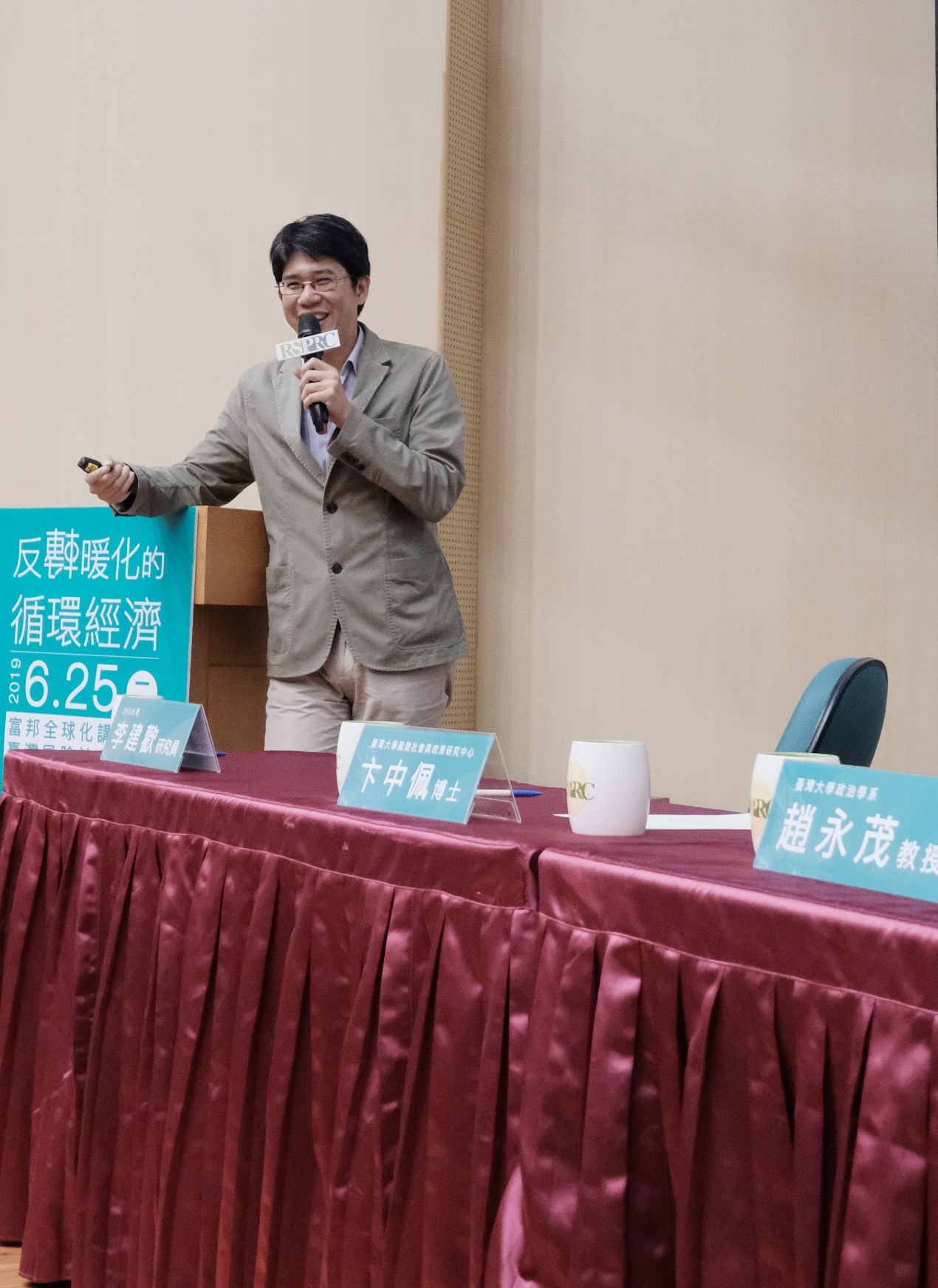
RSPRC Postdoctoral Fellow Dr. Chung-pei Pien explained that there is a difference between green finance and green capital flows, and that green financing flows are not only about investing in green industries and green energy investments. Dr. Pien explained that there are four key drivers to promoting green financing flows: by working with the public, finance, government and international sectors.
Dr. Pien also shared that our center has conducted surveys to find out the Taiwanese's perceptions of green finance in Taiwan, and found that 86% of the respondents agreed that their investments should consider factors relating to climate change and low-carbon energy.
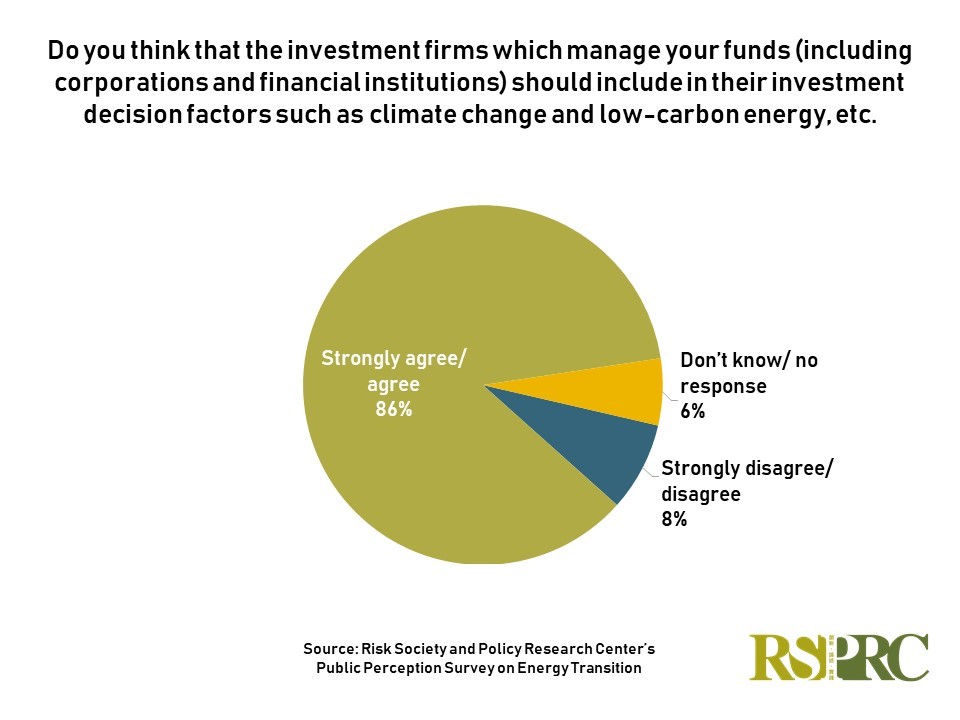
However, our survey also found that 86% of the respondents did not know the industries their pension funds are invested in, showing a gap between their level of concern and their actual knowledge.
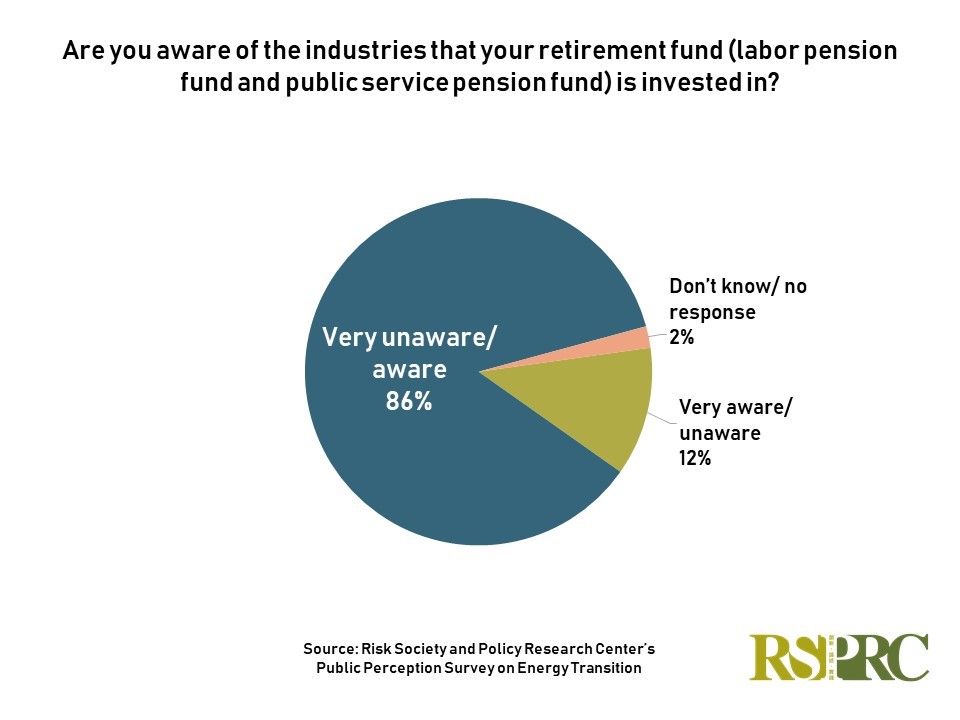
Dr. Pien also explained that while some investors have invested in the high-carbon industry with the expectations of high profits, the strengthening of regulations against high-carbon industries is expected to reduce the profits of these industries down the road. In fact, research conducted by Carbon Tracker estimated that the global pre-tax refining margins would fall by over half, from US$147 billion in 2015 to US$73.5 billion in 2035, which is likely to also impact on the finance industry, he said.
Dr. Pien also highlighted that 13 Taiwanese companies have signed up to be part of the TCFD, but available data under the Asset Owners Disclosure Project (AODP) where four companies have been scored showed them receiving the two lowest scores (D and X), out of a five-level scoring (the top three scores are A, B, and C.).
To ensure that Taiwan's finance system would be able to withstand the climate risks that are to come, RSPRC has therefore made the following recommendations: in the short term within the next three years, the finance industry should adopt the TCFD of which is already ongoing, with the aim to obtain a score of at least a B or C. Over the medium term in the next five years, the government should create a list of blacklisted companies which produce high-carbon emissions and pollution, and to stop investing in them. Over the longer term horizon in the next 10 years or so, private finance companies should also follow suit to cease investments in blacklisted companies, and strategies should have been developed by that time to meet the 2050 target of zero net carbon emissions.
Sharing by National Development Council (NDC) Deputy Minister Cheng-mount Cheng
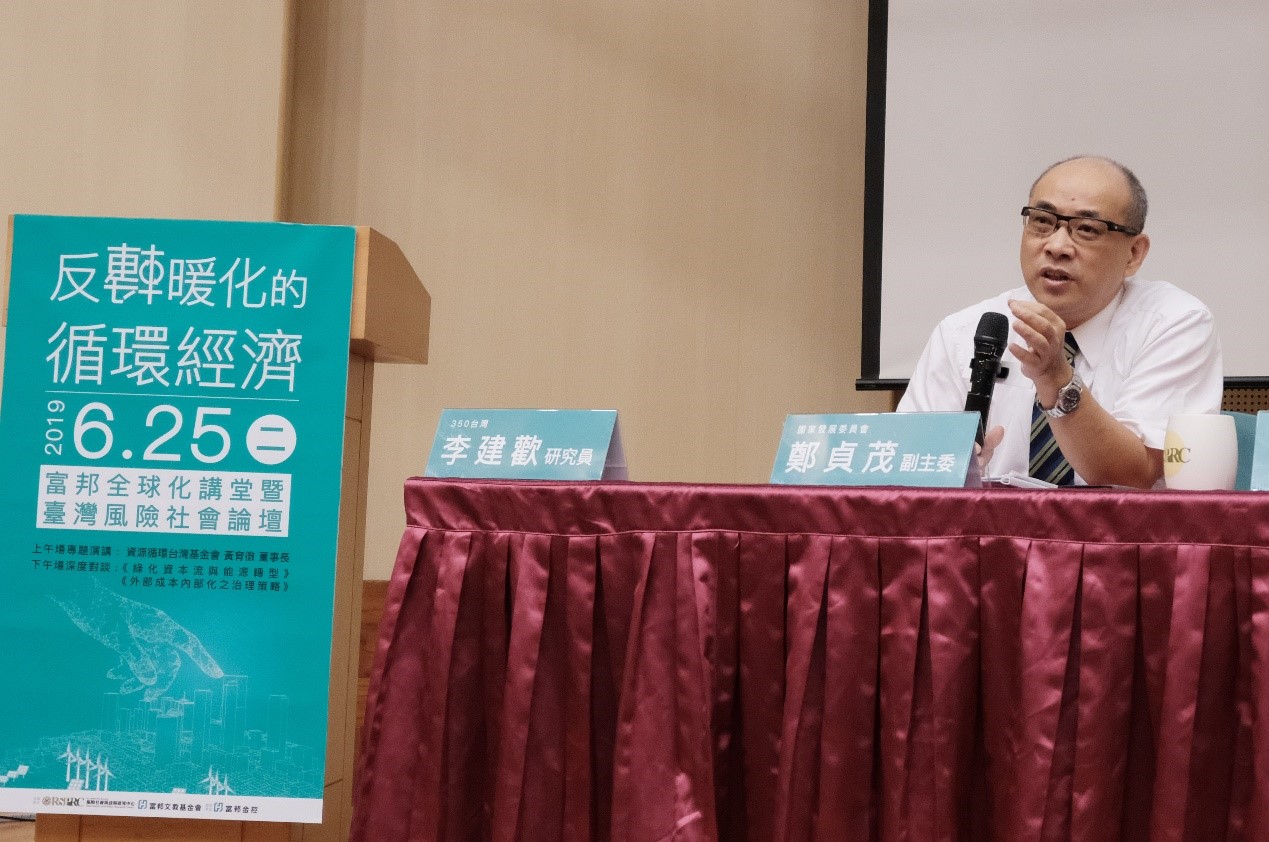
National Development Council (NDC) Deputy Minister Cheng-mount Cheng pointed out that even though Taiwan is not a signatory to the Paris Agreement which requires countries to implement strategies to limit the global temperature increase to within 1.5°C, Taiwan has nonetheless also adopted these targets. However, Taiwan might not be able to achieve these targets because industries are still engaged in high-emissions activities. He also pointed out that there is a need to address public resistance, for climate change initiatives to be successful.
Presentation by Fubon Financial Risk Management Deputy General Manager Wei-Chieh Hsu: The Prospects and Challenges Facing Taiwan's Sustainable Transformation
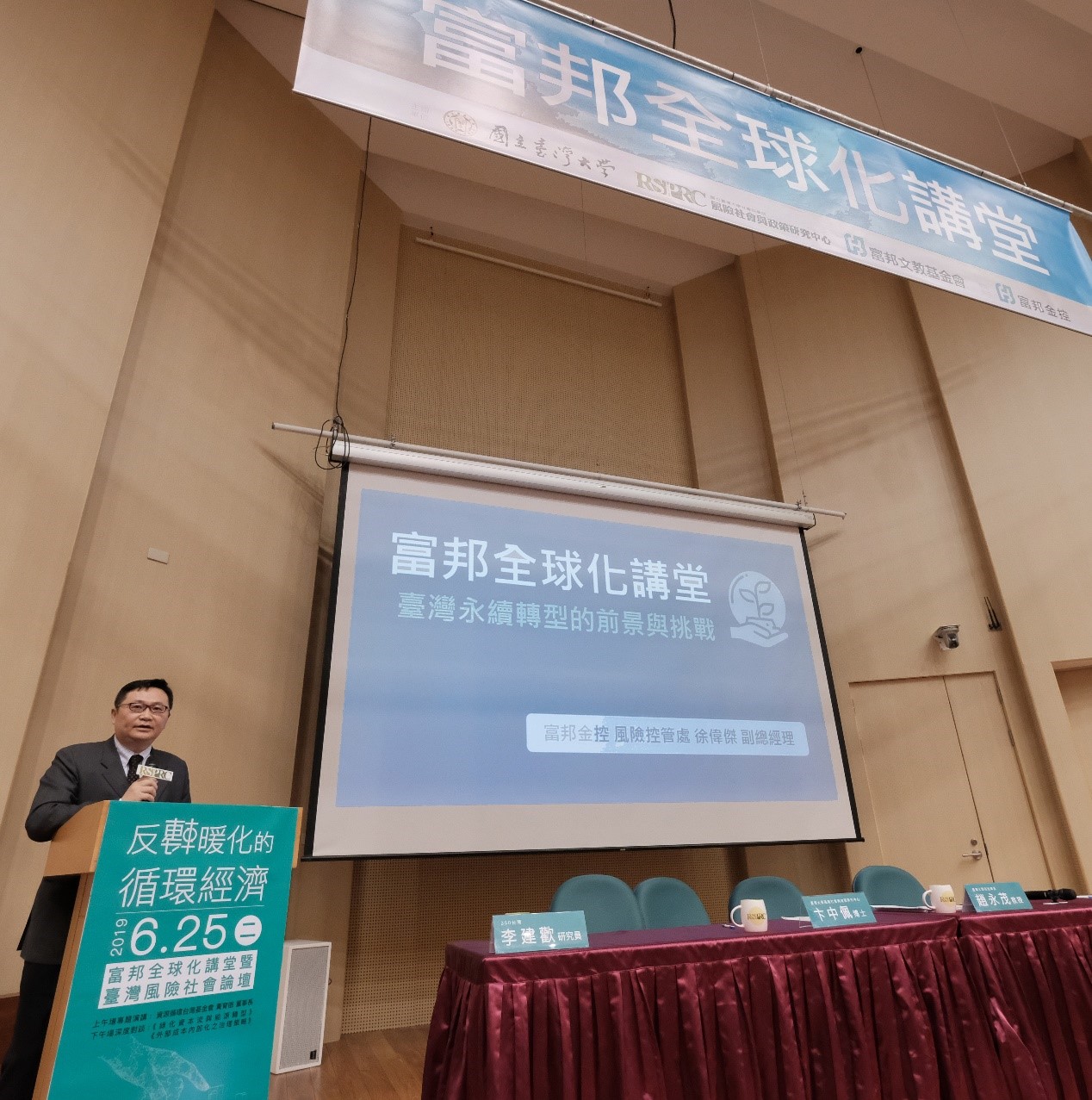
Fubon Financial Risk Management Deputy General Manager Wei-Chieh Hsu's presentation outlined the steps the Fubon Bank has taken to support sustainable transformation in the company's work. Mr. Hsu explained that even though the bank already has a stringent credit risk evaluation process in place to evaluate their borrowing companies, this traditional framework has become insufficient, and the bank has therefore also developed a risk management framework that incorporates a wider set of indicators, such as whether borrowing companies have put in place environmental protection measures, climate change risk assessment, major human rights impact assessment, and corporate social responsibility reviews.
In addition, the bank has also adopted the UN Principles for Responsible Investment (PRI), which requires the bank incorporate ESG issues in their investment decisions and to promote the implementation of the PRI within the investment industry as well. The Fubon Bank also uses the SDG framework in their investment decisions, and have invested NT$87.8 billion in SGD goal 3, on good health and well-being, NT$13.5 billion in goal 7, on affordable and clean energy, NT$535 billion in goal 8, on decent work and economic growth, and NT$60 billion in goal 9, on industry, innovation and infrastructure.
Presentation by 350.org Taiwan Researcher Chien Huan Lee: Greening Financial Flows and Energy Transition: International Advocacy and Case Studies
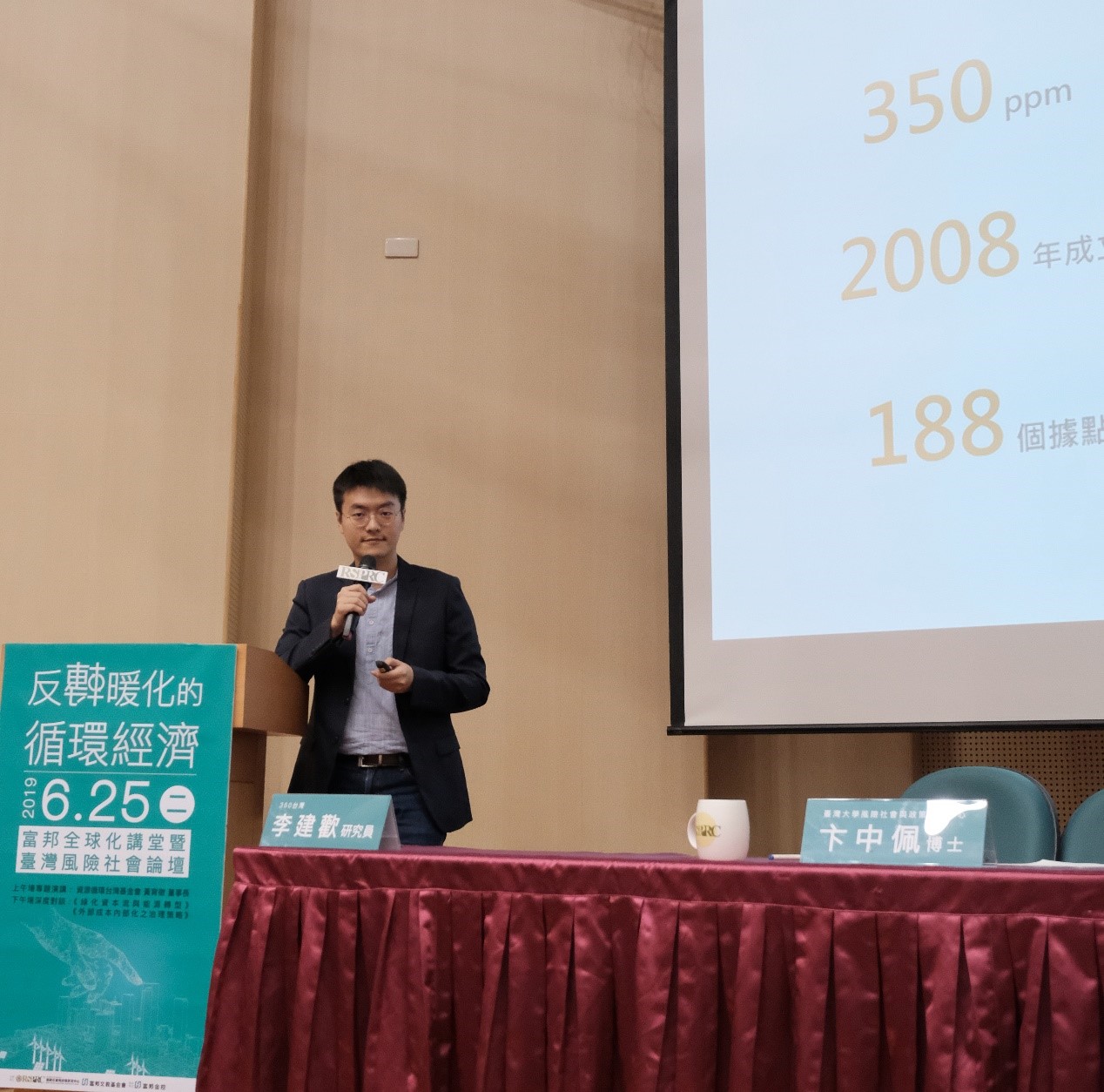
350.org Taiwan researcher Chien Huan Lee gave the audience a quick overview of the work 350.org has done, and a short history of the global development of green capital flows. The 350.org makes three broad demands: a 100% renewable energy target, no more new fossil fuel projects, and for investments in dirty energy to completely cease. Pointing to Carbon Tracker's estimates, Mr. Lee highlighted that 4,547 billion tons of carbon dioxide could be released if the world's estimated coal, gas and oil reserves are used up, but even if the world would use up only 20% of these fossil fuels, 900 billion tons of carbon dioxide would still be released leading to temperatures increasing by 2°C, and resulting in a point of no return.
Mr. Lee also highlighted that green finance took on a global focus in 2013 when the World Bank announced that it would adopt finance restrictions on coal companies, which was followed by the Norwegian Sovereign Wealth Fund divesting from coal companies in 2015. However, Mr. Lee pointed out that companies which have reduced their carbon emissions and invested in renewable energy cannot be classified as green finance industries if they continue to produce high carbon emissions. For this reason, the Climate Bond Initiatives (CBI) has decided to not classify some Taiwanese companies as green finance industries. Mr. Lee also shared data on the institutions which have been divesting from fossil fuels, of which 28% are from faith-based organizations, 17% are from philanthropic foundations, 15% from educational institutions and government agencies each, and 14% from pension fund investments. Mr. Lee also brought up a chart which highlighted the top "dirty" 30 banks by lending from 2016 to 2018, which showed three Japanese banks to be among the top four.
Recent school strikes have also been a force to be reckoned with, in the effort to fight climate change, Mr. Lee highlighted, and pointed out that NTU students had also been successful in pressuring the university to divest from dirty energy. In addition, 350.org is currently also developing a standard operating procedure (SOP) to provide a framework with which to influence industries to move towards more appropriate investments.

The event summaries of the other sessions can be found in the links below:
Part 1: Opening Address and Keynote Speech
Part 2: Morning Session – Circular Economy Strategies to Overcome Global Warming
Part 4: Late Afternoon Session – Policies and Strategies for the Internalization of External Costs